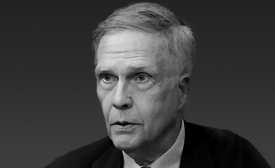henry kissinger

The longtime American Diplomat discusses his new oral history on Henry Kissinger, the role of public diplomacy in foreign policy, and U.S.-China relations.

Master of Public Diplomacy candidate and student diplomat Wa'el Nimat discusses how Ping-Pong Diplomacy between the U.S. and China represents a non-traditional tool of diplomacy.
On February 28, we celebrate the 45th anniversary of the Shanghai Communique. The 1972 agreement, brokered by Secretary of State Henry Kissinger and Chinese Premier Zhou Enlai, ended 23 years of diplomatic estrangement between the United States and China, and laid the foundation for a peaceful and prosperous Asia. The Vietnam War was still raging when the Communique was signed but there has been no major war in the Asia-Pacific since that time.
A new museum celebrating the history of American diplomacy is being built at the U.S. Department of State. The U.S. Diplomacy Center (USDC) will feature 238 years of American diplomatic history, as well as an education area for students interested in diplomatic careers.
Thousands of Singaporeans braved torrential rains on Sunday for a final farewell to the country’s founding prime minister, Lee Kuan Yew, whose funeral drew a long list of leaders and dignitaries from across the globe.
Libya is in civil war, fundamentalist armies are building a self-declared caliphate across Syria and Iraq and Afghanistan's young democracy is on the verge of paralysis. To these troubles are added a resurgence of tensions with Russia and a relationship with China divided between pledges of cooperation and public recrimination. The concept of order that has underpinned the modern era is in crisis.
"I've got a near-torn Achilles," Henry Kissinger said outside the door of his apartment building. "Like Kobe Bryant," said Samantha Power, the United States ambassador to the United Nations, as she helped him into the van. "Who?" he asked as he settled into the seat for the ride to Yankee Stadium.
Diplomatic elder statesmen Henry Kissinger and Zbigniew Brzezinski told Fareed Zakaria on Sunday that Russia's prime motivation in its Syria diplomacy was stability. Speaking on "Fareed Zakaria GPS" on CNN, both said the superpower deal on Syria was designed to allow President Vladimir Putin to combat the tide of radical Islamic power in the region and also within his nation's borders - but that the U.S.-Russia deal on Syria also managed to extricate the United States from a difficult situation.







